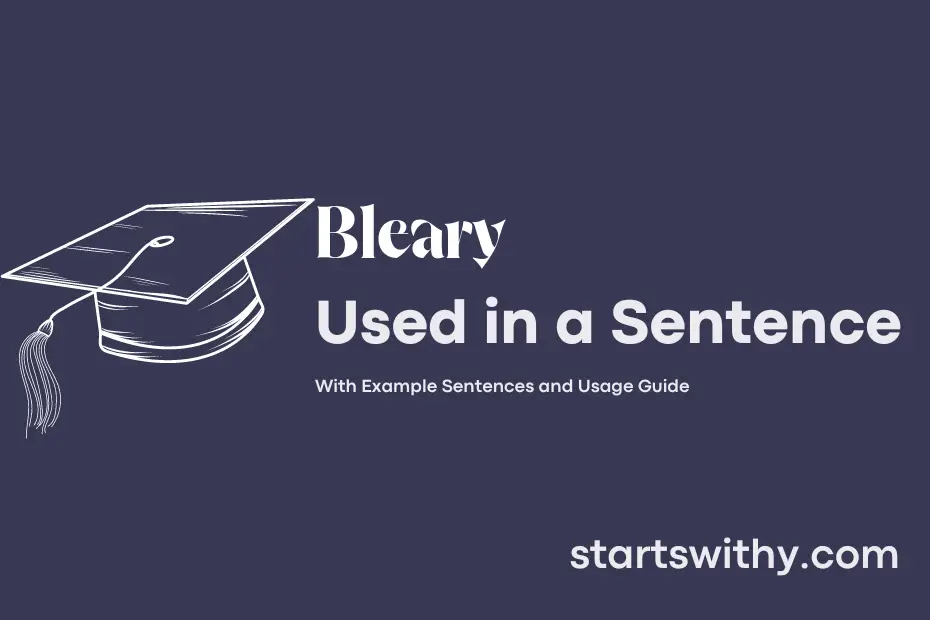Have you ever felt like your eyes were heavy, tired, and unfocused? That’s the sensation of being bleary. When you’re bleary, your vision is cloudy, and it’s hard to see clearly.
Bleary eyes are a common occurrence after a long day of work, studying, or staring at screens. It’s that feeling when you rub your eyes, trying to shake off the weariness, but everything still seems blurry and out of focus.
7 Examples Of Bleary Used In a Sentence For Kids
- The bleary bear yawned and stretched in the morning.
- The bleary owl stayed up too late and now feels tired.
- The bleary puppy rubbed its eyes after waking up from a nap.
- The bleary kitten blinked sleepily in the sunshine.
- The bleary elephant had trouble focusing its eyes after a long day.
- The bleary bunny hopped slowly after staying awake all night.
- The bleary fish swam lazily in its tank, looking tired.
14 Sentences with Bleary Examples
- After pulling an all-nighter studying for exams, her eyes were bleary from exhaustion.
- He stumbled into his morning lecture with a bleary expression on his face, clearly in need of more sleep.
- Trying to focus during a boring lecture with bleary eyes was a struggle for her.
- The dimly lit library made her feel even more bleary as she tried to finish her assignments.
- Waking up early for a class after a late night of partying left him feeling bleary and disoriented.
- Juggling multiple assignments and deadlines left her feeling constantly bleary from lack of adequate rest.
- Staying up late chatting with friends, her eyes were bleary the next morning during her presentations.
- He rubbed his bleary eyes as he tried to decipher his messy notes from the hasty lecture.
- The combination of heavy workload and extracurricular activities left her feeling bleary throughout the week.
- Trying to stay awake during a long and boring seminar became a battle against bleary eyes for him.
- The early morning cricket match after a night of celebration left him feeling bleary on the field.
- She tried to focus on her computer screen through bleary eyes after a long day of classes and studying.
- The dreary weather outside added to her bleary mood as she completed her assignments.
- Despite his bleary eyes, he forced himself to attend the important guest lecture on campus.
How To Use Bleary in Sentences?
To use the word Bleary in a sentence, you can describe a feeling of tiredness or lack of focus due to lack of sleep or excessive strain. For example, “I tried to read the book last night, but my eyes were so bleary from staying up late studying that I couldn’t concentrate.”
Alternatively, you can also use bleary to describe something that is unclear or difficult to see clearly. For instance, “Through his bleary eyes, he could barely make out the figures moving in the distance.”
When including bleary in a sentence, make sure to choose the appropriate context based on its meaning. Whether you are referring to physical fatigue or blurred vision, ensure that the word bleary helps convey the exact message you intend.
Remember, Bleary is an adjective used to describe a physical state or unclear vision, so it should be used accordingly in your sentence. Experiment with different sentence structures to familiarize yourself with how bleary can enhance your writing and effectively communicate your intended meaning.
Conclusion
In conclusion, sentences with “bleary” evoke images of blurred vision, fatigue, or a lack of clarity. Whether describing tired eyes from sleeplessness or a foggy mind struggling to focus, these sentences paint a vivid picture of physical or mental weariness. “Her bleary eyes pleaded for a moment of rest” and “He stared at the screen with a bleary expression, struggling to concentrate” are examples that capture the theme of exhaustion conveyed through this word.
The word “bleary” effectively conveys a sense of fatigue or haziness in various contexts, illuminating the impact of tiredness on the body and mind. By using this word in sentences, writers can vividly depict the physical or mental strain experienced by characters or individuals, eliciting empathy and understanding from readers.



